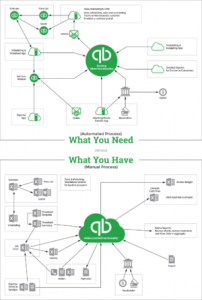Good question.
As we’ve said elsewhere, each of Quickbooks’ three editions (Online, Pro, Premier) can have multiple versions (eg. 2013, 2016), flavours (eg. Contractors, Non-Profit, Retail), and regions (eg. Canada and US for most of our readers). Features (Budgets, Forecasts, Class Tracking, number of standard reports) can change by any of these.
The answer is “it depends on two things: who are the users – of inputs and of outputs – and what are their needs?”.
That’s not a complete cop-out, actually. Small businesses have different needs from large ones, startups have different needs from established businesses, and not for profits have different needs from contractors.
It’s not a one-off, either. You may have to re-evaluate as your business grows. If you’re like many owner-managers (i.e. you’re one type of user), you opted for Quickbooks Online (QBO) to start, because it’s convenient, and the monthly fee is easier on your cash flow (your needs).
Established businesses often outgrow QBO, which currently lacks some functionality of its desktop brethren. (If you have a lot of manual workarounds – it’s likely that you’ve outgrown QBO.)
The biggest tradeoffs are in cost, features, and accessibility. QBO offers low cost on a per-month basis, and multiple-user access, but lower features. Its desktop counterparts (Pro and Premier) have a larger up-front purchase cost, and additional features, but the multi-user access doesn’t seem much good if you don’t have a LAN to put it on.
There’s a workaround to this: put Pro (or Premier) on the Cloud. (And no, you can’t just throw the files on your Dropbox directory – see our WARNING at the end of the article.) We work with dedicated third-party providers who in essence provide a Quickbooks LAN. For about $60 per user per month, you get multi-user access to Pro and Premier’s features without paying for a LAN.
Profit Breakthrough:
Our recommendation to established SMEs which continue to grow (i.e. our target market) is to move away from QBO and to Pro and Premier. (The exact edition and flavour will depend on your needs.)
We also recommend hosting the files on the cloud with a Quickbooks-approved service for best of both worlds: the higher functionality offered by Pro/ Premier, with multi-user access over the cloud, at a relatively low cost.
A Caveat:
Quickbooks’ business plan (as expressed by their support desk in March 2016) is to move to a monthly subscription model: Pro and Premier will only come in online versions. [Update: At November 2016, that is already the case if you want to buy their Payroll module (and in fact their website does everything it can to imply that they no longer sell the standalone PC version).]
For now, our recommendation holds: run the desktop version on the cloud using a dedicated hosting company. In the future, the decision may just come down to the monthly cost you can afford vs the features you need.
WARNING:
You will destroy your data if you run your Pro or Premier data files (*.QBW) from cloud storage software (eg. Box, Dropbox, or OneDrive). Quickbooks’ multi-user mode contains a virtual “traffic cop”: it maintains one copy of the database, and restricts traffic to it: one user can write to one piece of it at a time. In contrast, cloud storage software downloads a copy of the database to each active user’s computer, which creates version control issues as one copy tries to overwrite the other. You can find more detailed information on this subject, including the related question about storing backups of your QBW on the cloud (which is fine – we do it ourselves), here.
We welcome your Comments! Please also feel free to Contact us, either via email or using our website, if you would like to discuss upgrading to Pro or Premier and moving to the Cloud.

